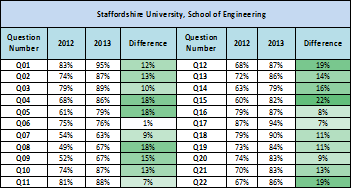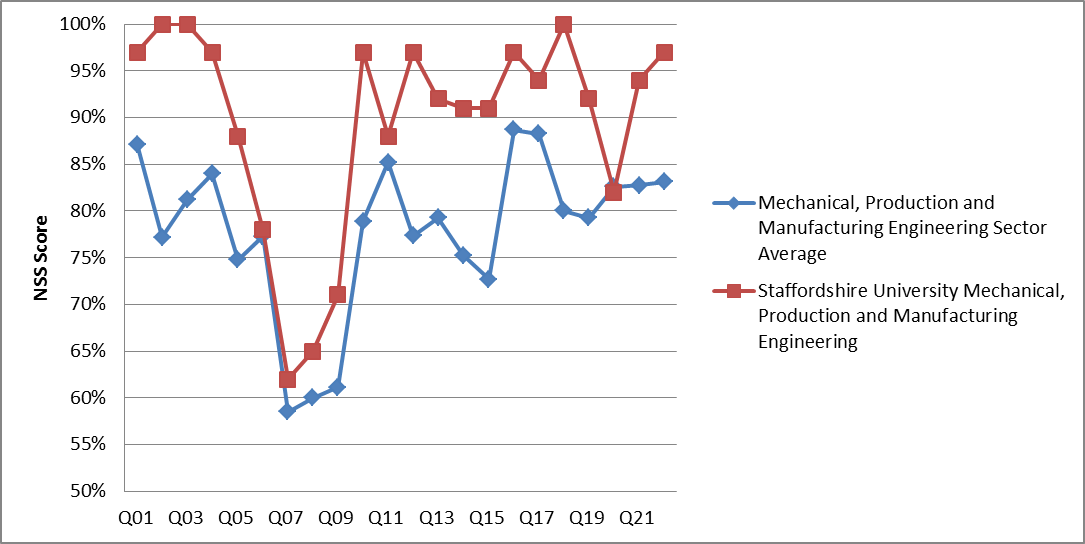This is the third Student Experience Success article; this time looking at Staffordshire University’s, School of Engineering NSS results and the four key aspects that have resulted in the BEng (Hons) Mechanical students rating the award so highly for student experience in 2013.
 The table to the right compares the School of Engineering’s 2012 and 2013 NSS scores and indicates that every score has increased, with 16 scores increasing by more than 10%.
The table to the right compares the School of Engineering’s 2012 and 2013 NSS scores and indicates that every score has increased, with 16 scores increasing by more than 10%.
The table below compares Staffordshire University’s, School of Engineering NSS results with the sector average for Engineering and Technology. For almost every NSS question in 2013, Staffordshire University’s School of Engineering scored above the sector average, in many cases scoring 5-10% higher. The only question that scores below the sector average is Q6 and this is only by 1%.
Although the data helps to indicate success, it does not tell us why the students are scoring so highly. This article looks at the Staffordshire University’s BEng (Hons) Mechanical Engineering award and why their students have scored them so highly. This award has been specifically chosen, as it was the highest scoring overall award in Staffordshire University’s School of Engineering
Through consultation with the School of Engineering, this article has identified four key aspects behind the award’s student experience success.
1) Assessment and feedback types
Examination feedback is an aspect that has been highlighted in a previous article focusing on student experience success and again it is an initiative that the BEng (Hons) Mechanical Engineering award’s students recognise as being very helpful.
The award provides each of its students with statistical analysis of the answers to each question, including a breakdown of marks, the number of attempts to each question and a clear commentary of where marks were gained and lost. The students particularly like this feedback as they are able to compare their achievements against the rest of their cohort (albeit anonymously), giving the students a better sense of where they need to focus extra attention and concentrate efforts for future examinations.
The award also provides feedback electronically via Blackboard for all assessments as well as ensuring the feedback includes comprehensive comments. This ensures that the students can receive and access their feedback wherever they are and understand where they have been successful and conversely where they can improve.
An aspect the students particularly enjoy on this award is the variety of assessments available within and across modules. Variety is a common theme throughout NSS as students typically want to be able to have the option to choose their own path. By providing a variety of assessments, the award helps to ensure the students are interested and engaged in each assessment they carry out.
2) Increased tutor contact hours with students and personal tutoring approach
The importance of ensuring each student has a close relationship with their award/department/university is a topic that has been touched on in a previous article and again is an aspect that this award recognises as being central to the student experience.
In an effort to improve in this area, the award has recently increased its contact hours helping the tutors and students to get to know each other better and create an excellent student-staff relationship. As well as increasing contact hours, staff have an open door policy as well as in-formal and formal structure to personal tutoring sessions. Students are able to contact and see tutors anytime but there also scheduled group sessions that work on different skill development activities.
These initiatives help the award’s staff to understand their students’ needs as well as be there for their students when they need them. This can only help to give improve the experience for the students.
3) Large proportion of research informed teaching
As shown by the 2013 NSS data, the scores for NSS Q’s 1-4 are very high and far above the sector average for the subject. This is likely to be due to the award embedding the research activities of the staff into the curriculum and encouraging student involvement wherever possible. These research activities include large scale projects such as the 7 million Euro funded ARBOR project in biomass renewable energy, which the award has managed to feed into multiple modules. The award’s students also get involved with sub-projects as part of their final year assessment, including the use of a biomass boiler to conduct experiments perhaps helping to explain the very high NSS Q18 score.
Ensuring the research activities of staff are embedding in the curriculum, helps to ensure staff are enthusiastic and knowledgeable about their subject and by encouraging the students to be involved in the research projects again helps to build the staff-student relationship. By embedding staff research activities into the teaching, students can appreciate and engage with what they are being taught as well as further their learning by being involved in the staff’s research activities.
4) Students understanding of employability and professional development
With the increase in tuition fees, employability is now one of, if not the highest item on each student’s agenda when choosing a University and award to study. Therefore employability and professional development are key aspects of the student experience which the students pay close attention to throughout their studies.
The BEng (Hons) Mechanical Engineering award ensures it is well publicised during recruitment and is able to boast an average starting salary of £28700 for its graduates, significantly above the sector average salary (£18-20k). This helps to ensure that students wanting to study in this field are aware of what they can achieve if they study this award at Staffordshire University. The students are then told about employment opportunities from the very beginning i.e. induction week, until after they finish the award. This helps the students to be very engaged in these employability activities.
Further to this the students’ final year project has recently been changed to incorporate bespoke skill development activities for each student and project type. This project develops the students professional skills, helping them to move towards becoming a “professional engineer” whilst also giving each student a feeling of a unique experience.
The four points included in this article highlight key aspects that have enabled Staffordshire University’s BEng (Hons) Mechanical Engineering award to provide an excellent student experience for its students. Throughout these initiatives, there is the feeling that Staffordshire University’s School of Engineering staff want to engage with their students as much as possible and provide their students with the best possible opportunities. These efforts are clearly recognised by their students and perhaps offer an explanation for why the School of Engineering and more specifically the BEng (Hons) Mechanical Engineering award score so highly in NSS.
I hope you have found this Student Experience Success article interesting and useful. If you have any comments, questions or would like to discuss anything further you can use the comments box at the bottom of the article, or alternatively leave a message on The Student Experience Group Twitter/Facebook page.
Also, you can be alerted when new articles are posted online by either following The Student Experience Group on Twitter, liking the Facebook page or by entering your details for the newsletter (right hand toolbar). Finally – if you do like the article, please let others know by liking/retweeting using the Facebook/Twitter buttons at the bottom of the page to let others know about the article and the website.

